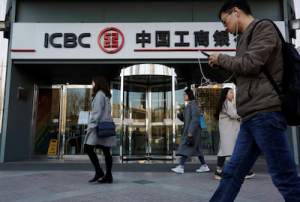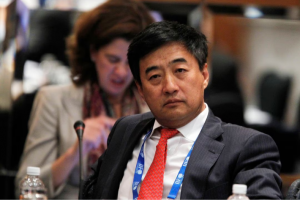China’s one-time biggest shadow bank, Zhongzhi Enterprise Group, has been accused of turning to aggressive and potentially illegal sales practices as it desperately tried to avoid collapse.
Zhongzhi declared insolvency last year but new records reportedly reveal that the firm engaged in possibly criminal practices, using new investor funds to pay returns on existing wealth management products.
China’s years-long property boom had propelled Beijing-headquartered Zhongzhi to the top of the country’s $18 trillion asset-management industry and made it a key player in a shadow banking sector the size of the French economy.
Asset managers such as Zhongzhi sell wealth-management products to investors. The proceeds are then channeled by licensed trust firms like its Zhongrong unit to developers and other companies that cannot tap bank funding directly because of poor creditworthiness or other reasons.
Also on AF: Continuing Rise of Methane Emissions Worrying Top Scientists
Previously unreported details show that about a year before its financial troubles burst into the open, Zhongzhi units were also promising individual investors lucrative returns that belied the group’s exposure to a deepening property crisis.
China’s trust firms are known as shadow banks because they operate outside many of the rules that govern commercial lenders.
But China’s top banking regulator in 2018 specified that financial institutions including shadow banks and asset managers should not set up capital pools, to prevent them from using money from new sales to cover returns on existing wealth-management products, nor should they guarantee returns on wealth-management products.
Zhongzhi appears to have violated both those requirements, two lawyers said after reviewing Reuters’ findings at the request of the news agency. The lawyers added that such wrongdoing can result in fines and prison sentences of up to 10 years.
“The core of its suspected illegal action is raising money from investors through its licensed financial institutions to fund the group’s business operations and expansion,” said Zhang Guanghui, an attorney at Guangdong Suijia Law Firm.
Zhongzhi and its units identified in this story did not respond to detailed requests for comment about the practices outlined by Reuters.
Chinese officials were similarly tight-lipped. China’s ministries of public security and justice, which oversee the Beijing police and prosecutors, respectively, did not respond to queries about the cases against people connected to the shadow bank.
Liquidity Crisis
China’s National Financial Regulatory Administration and central bank also did not respond to requests for comment about Zhongzhi units’ practices.
The liquidity crisis at Zhongzhi became public when trust unit Zhongrong missed payments on dozens of products in the third quarter of 2023, fuelling investor protests and worries that China’s property meltdown was spilling over into its $66 trillion financial industry.
Eventually, Zhongzhi told investors in November 2023 that it was insolvent with up to $64 billion in liabilities. The group filed for bankruptcy liquidation in January, while Beijing police probed its business practices.
In March, Beijing police said on WeChat that wealth-management firms under Zhongzhi should cooperate with police and return any illegal income.
In August, Beijing prosecutors said they had charged 49 suspects related to Zhongzhi on suspicion of illegally absorbing public deposits, without providing details.
Public deposits flowed into Zhongzhi’s shadow bank operation via the funds the investors placed in the wealth-management products that Zhongzhi’s licensed financial units were selling. Reuters couldn’t determine the specific deposits or units to which the prosecutors were referring.
- Reuters with additional editing by Sean O’Meara
Read more:
Chinese Shadow Bank Zhongzhi Files for Bankruptcy, Court Says
Two Executives From China’s Zhongzhi Missing After Collapse
China Wealth Manager Zhongzhi Admits to $64 Billion in Liabilities
Struggling Chinese Asset Manager Zhongzhi Looking at Debt Rejig
























